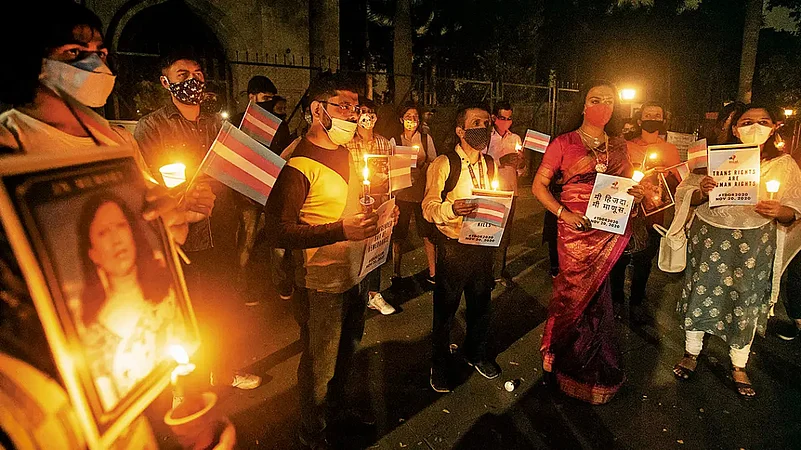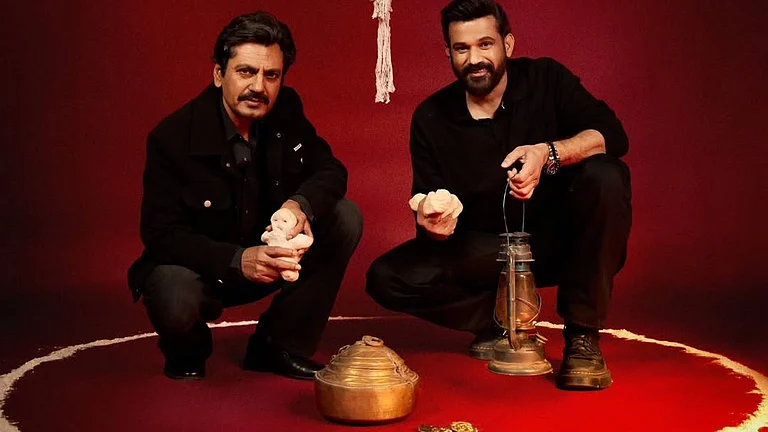Vyjayanti Vasanta Mogli was 11-years-old when she was first raped in a boys’ toilet of her school in Begumpet area in Telangana. Three of her seniors at the school—all of them cisgender males— allegedly pulled down Mogli’s trousers and sexually assaulted her. They were later joined by a school staffer as well. From then, the toilet became a chamber of horrors for Mogli as she was repeatedly raped and shamed there because she was a trans woman.
Those who assaulted her, however, have never faced punishment. “To punish an act, you need a law,” Mogli tells Outlook. “But there was no law protecting trans people from rape in India then. There isn’t really one now.”
Though the assault on her took place in 1990, it was only in 2015 that Mogli, who was by then a noted trans rights and Right to Information activist and classical singer, revealed the incident in a Facebook post. She never lodged a formal complaint with the police. “My lawyers told me that since the incident happened so long ago, I needed more proof,” Mogli says. “It would be an expensive and tiresome battle that I was not ready for.”

In 2014, the Supreme Court recognised trans people as the third gender in what is popularly known as the NALSA judgment. The recognition and subsequent laws passed by the government to protect transpeople sparked hopes in the queer community for greater safety. However, rights activists aver that violence continues unabated and often goes unreported. In 2020, the National Crimes Report Bureau reported only 236 cases of violence against trans people. In fact, there is major underreporting of cases of violence against transpersons. They have a hard time in police stations as cops often refuse to register cases. Indian laws dealing with rape recognise only women as victims and survivors, as they exclude trans people from their ambit. Moreover, the Transgender Persons (Protection of Rights) Act, 2019, is not stringent enough since rape of a transgender carries only a two-year jail term and a fine.
There is also a debate among certain sections of feminists and the queer community if the laws on rape in India should be made gender-neutral. While some feminists argue that this might dilute the law for women, the transgender community is also divided on this issue.

“The violence faced by the transgender communities reflects the unique circumstances of their lived experiences, which cannot be compared to that of a woman’s or any cis-het person’s,” says Mogli, who lives in Hyderabad. She adds that a law, on the lines of the Scheduled Caste and Scheduled Tribe (Prevention of Atrocities) Act, 1989, to prevent atrocities and counter transphobic violence can help cut down crimes against trans people.
But others argue that a different law to deal with the same crime might be problematic. “Rape is rape, be it of a woman, man, transperson or genderqueer,” says Swati Bidhan Baruah, a judge at a Lok Adalat—a dispute-resolution forum—in Guwahati, who became the first transgender judge in Assam in 2018. “If we have a separate law for transpeople, what about gay men or intersex people?” says Baruah. “How would that law define who a trans person is? Would trans men fall under trans laws or women’s laws? Having a uniform, gender-neutral rape law ensures protection and justice for all,” adds the judge.
However, both the judiciary and the legislature have been passing the buck for long. In 2017, for instance, a local court in Telangana ordered the state government to provide compensation to Sonia Sheikh, a trans woman, who survived a gang rape and an acid attack by her jilted lover in Hyderabad in 2015.

In another instance in 2018, the Supreme Court refused to hear a plea for making rape laws gender neutral, shuffling the onus on Parliament and the government. The Centre responded by adding a provision in the 2019 Act that makes violence against the community a punishable offence. But it is far from a deterrent. “The punishment for raping a woman is life imprisonment or even death,” she says. “But the punishment for raping a transperson is only two years of imprisonment. This makes trans people an easy target.”
The laws punishing rape in India were made more stringent after the brutal gang rape and murder of a young paramedical student in Delhi in 2012. The countrywide protests against the heinous act led to a revision of the laws. However, no such respite is on offer yet for trans people, who are more often an easy target for human traffickers and are vulnerable to police brutality.
Many transpeople lodged in jails also report custodial violence and rape. In March last year, a trans woman lodged at the Nagpur Central Jail in Maharashtra moved the Bombay high court seeking justice for alleged rape. In 2021, the Nagpur bench of the high court led by Justice Z.A. Haq and Justice Amit Borkar directed prison authorities to get an FIR registered in the case.
A rare judgment, however, will not be very helpful, according to Baruah. “Lack of representation of transpeople in the judiciary, the police and the legislature has resulted in laws that do not address the problems on the ground,” Baruah adds.
In the absence of laws, transpeople are compelled to live the trauma of violence.
Even though Mogli survived the ordeal and has a successful career, the sight of a men’s toilet still brings back those traumatic memories and ignites concerns for what other transpersons face when accessing public spaces. “Sexual violence can leave scars that never heal,” Mogli says. “In our case, the scars overlap and keep deepening.”
(This appeared in the print edition as "Safety Still A Distant Shore")


























